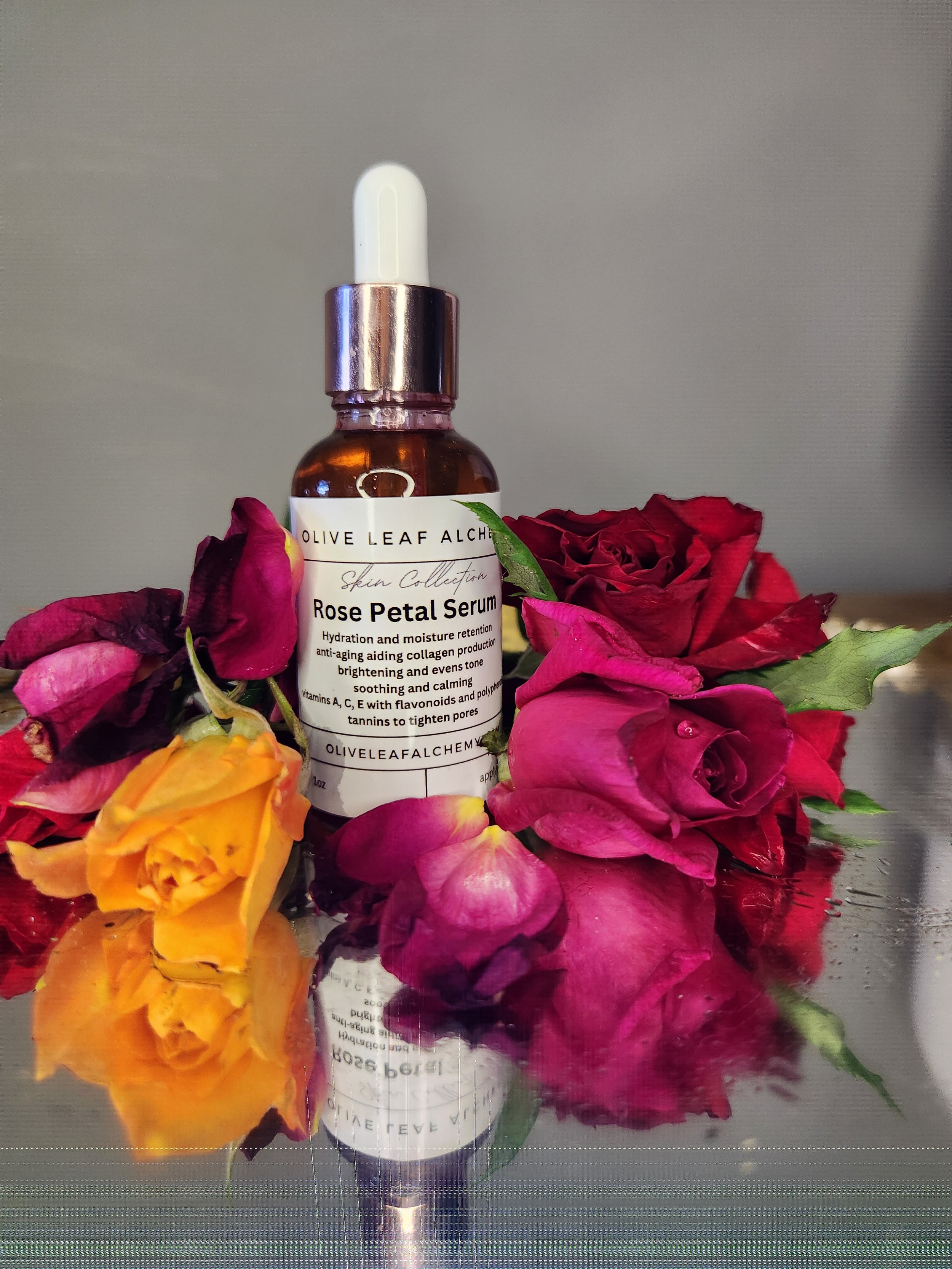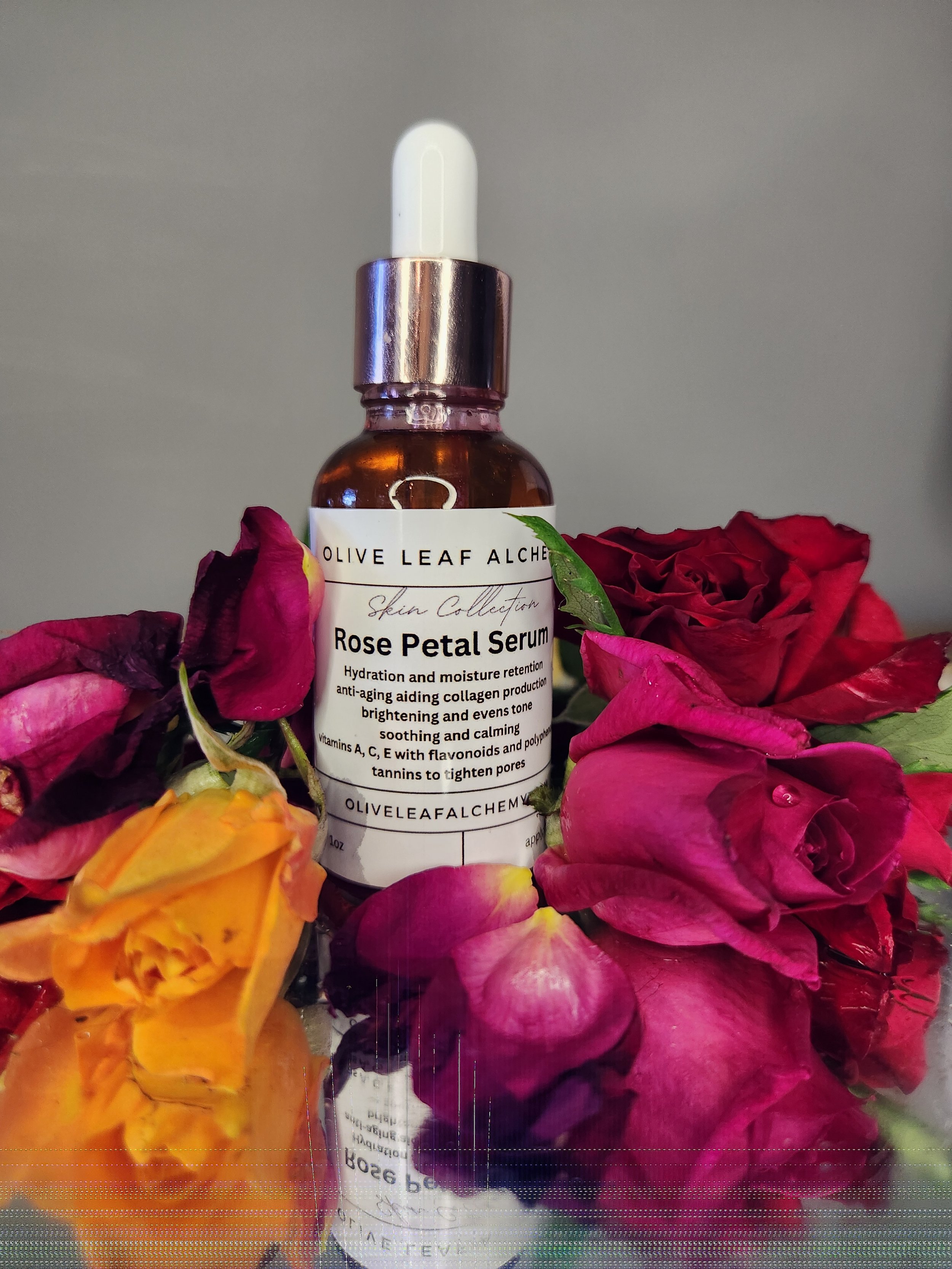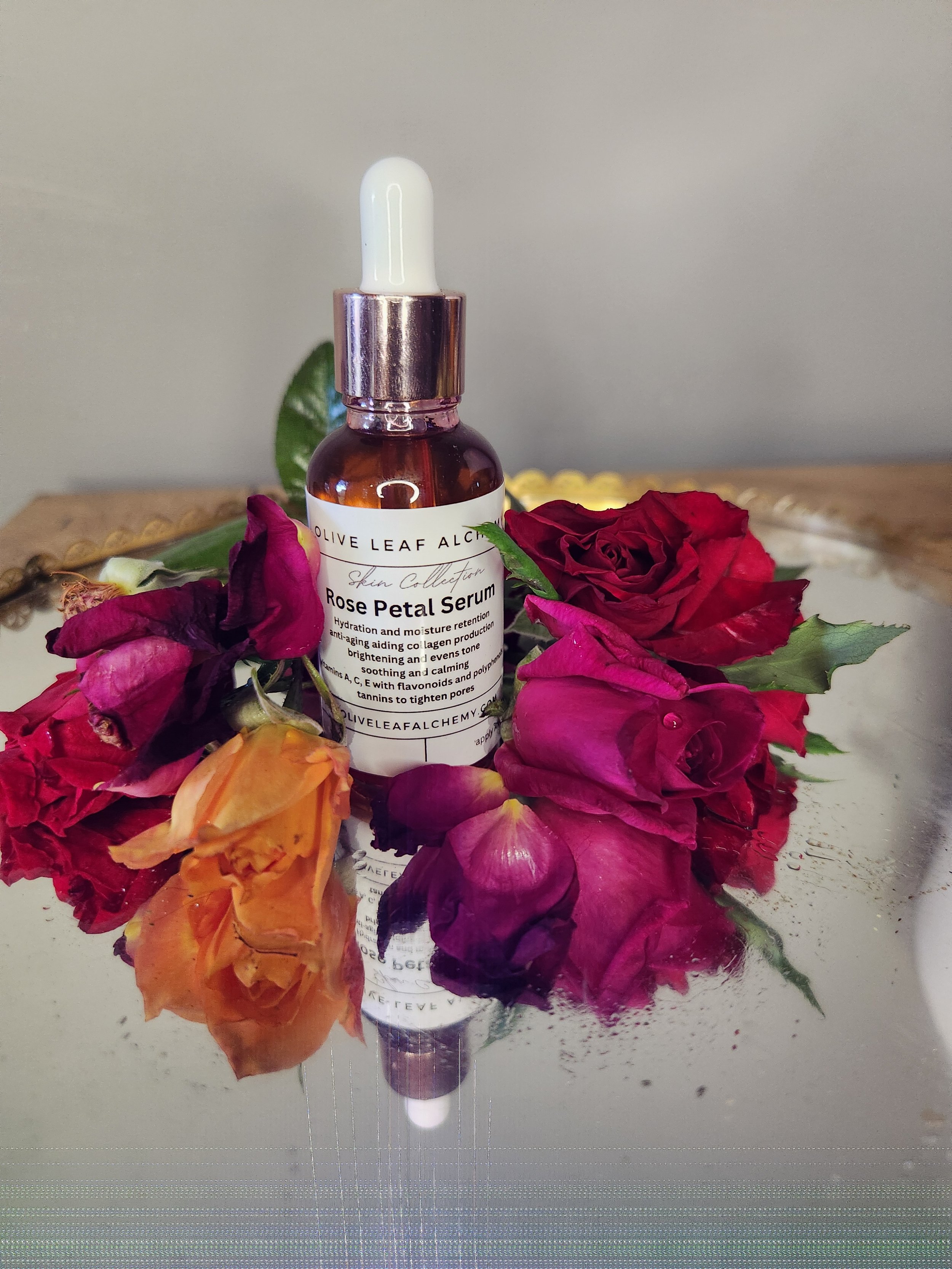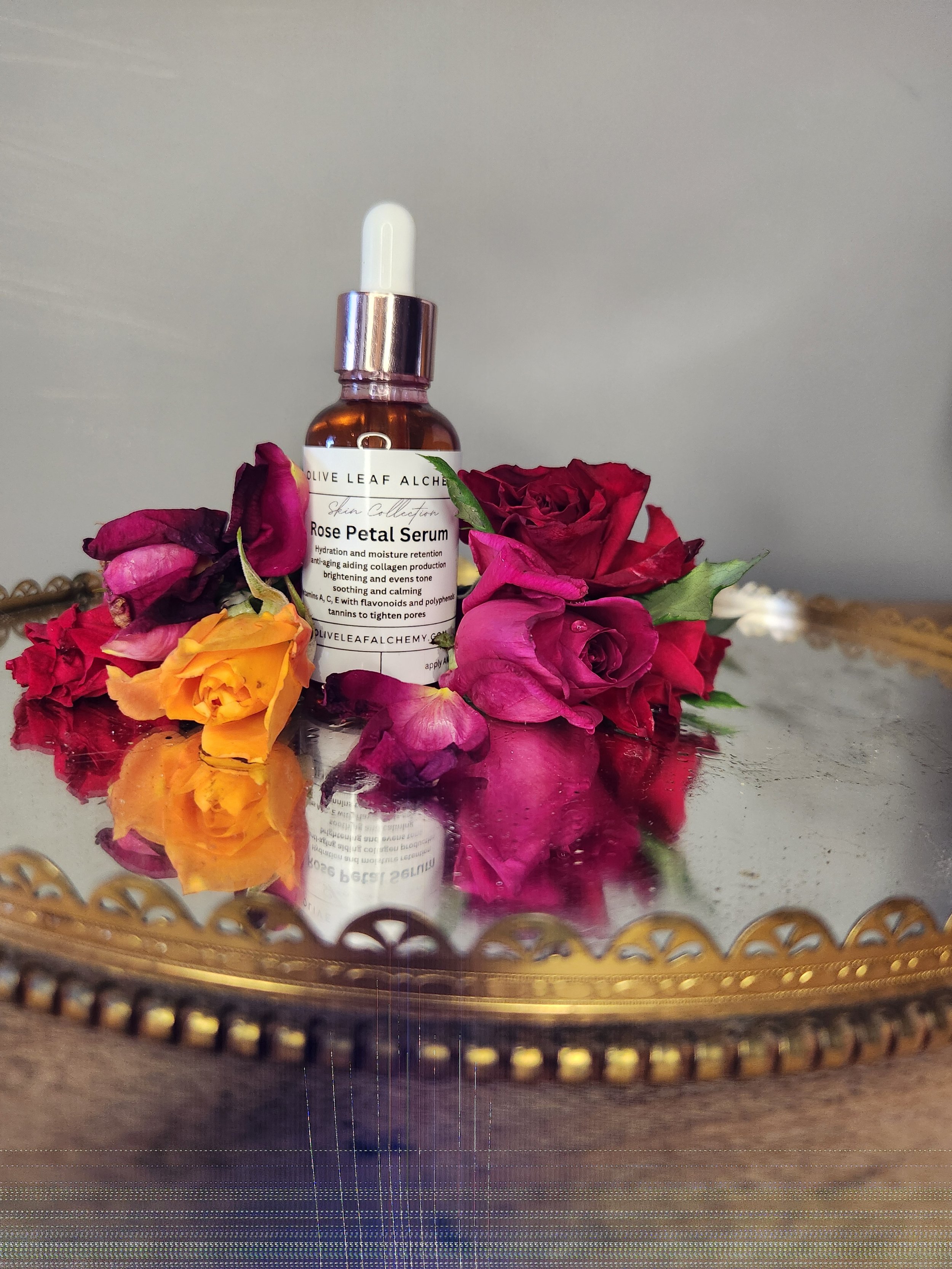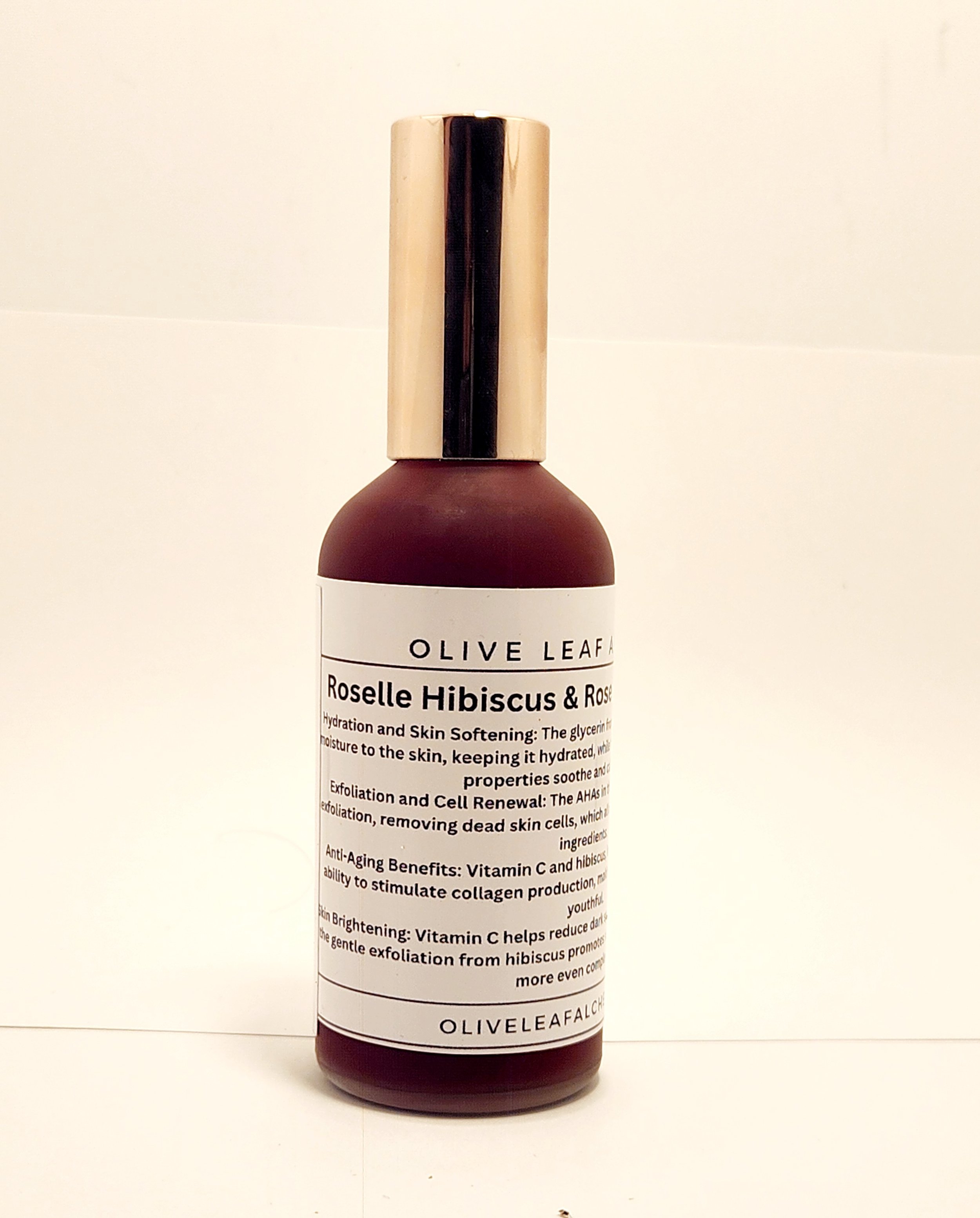Rose Petal Serum
Creating a serum with rose buds and plant glycerin can offer a variety of skin benefits due to the properties of these ingredients. Here's a breakdown of the benefits and active components:
Rose Buds
Rose buds, and rose petals in general, contain several beneficial compounds:
1. Vitamins: Roses are rich in vitamins A, C, and E.
- Vitamin A*helps to promote cell turnover and improve skin texture.
- Vitamin C is a powerful antioxidant that brightens the skin, promotes collagen production, and helps reduce signs of aging.
- Vitamin E is also an antioxidant that protects the skin from damage and helps to keep it moisturized.
2. Antioxidants: Rose buds are packed with antioxidants like flavonoids and polyphenols which help to protect the skin from free radical damage and environmental stressors.
3. Anti-inflammatory Properties: Roses have anti-inflammatory properties that can help to soothe irritated skin, reduce redness, and calm conditions like acne and eczema.
4. Tannins: These can help to tighten pores and give the skin a smoother appearance.
Plant Glycerin
Plant glycerin (or glycerol) is a humectant, meaning it attracts moisture from the environment into the skin. Its benefits include:
1. Hydration: Glycerin helps to draw water into the outer layer of the skin, providing deep hydration and preventing dryness.
2. Skin Barrier Function: By maintaining moisture levels, glycerin helps to strengthen the skin’s barrier function, which protects against irritants and pollutants.
3. Smooth and Soft Skin: Regular use of glycerin can make the skin feel softer and smoother.
Combined Benefits in a Serum
When rose buds and plant glycerin are combined in a serum, they work synergistically to address various skincare concerns:
1. **Hydration and Moisture Retention**: Glycerin ensures that the skin stays hydrated, while the vitamins in rose buds help to nourish and maintain moisture levels.
2. **Anti-Aging**: The antioxidants and vitamins in rose buds promote collagen production and protect against free radical damage, helping to reduce fine lines and wrinkles.
3. **Brightening and Even Tone**: Vitamin C from rose buds can help to brighten the skin and fade dark spots, while the anti-inflammatory properties help to reduce redness and even out skin tone.
4. **Soothing and Calming**: Anti-inflammatory compounds in roses soothe irritated skin and calm redness, which is beneficial for sensitive and acne-prone skin.
Application
- **Daily Use**: Apply the serum after cleansing and toning, before moisturizing. It can be used both in the morning and at night.
- **Patch Test**: Always perform a patch test before using any new skincare product to ensure you do not have an allergic reaction.
Overall, a serum made with rose buds and plant glycerin can offer comprehensive skincare benefits, targeting hydration, anti-aging, brightening, and soothing concerns.
Creating a serum with rose buds and plant glycerin can offer a variety of skin benefits due to the properties of these ingredients. Here's a breakdown of the benefits and active components:
Rose Buds
Rose buds, and rose petals in general, contain several beneficial compounds:
1. Vitamins: Roses are rich in vitamins A, C, and E.
- Vitamin A*helps to promote cell turnover and improve skin texture.
- Vitamin C is a powerful antioxidant that brightens the skin, promotes collagen production, and helps reduce signs of aging.
- Vitamin E is also an antioxidant that protects the skin from damage and helps to keep it moisturized.
2. Antioxidants: Rose buds are packed with antioxidants like flavonoids and polyphenols which help to protect the skin from free radical damage and environmental stressors.
3. Anti-inflammatory Properties: Roses have anti-inflammatory properties that can help to soothe irritated skin, reduce redness, and calm conditions like acne and eczema.
4. Tannins: These can help to tighten pores and give the skin a smoother appearance.
Plant Glycerin
Plant glycerin (or glycerol) is a humectant, meaning it attracts moisture from the environment into the skin. Its benefits include:
1. Hydration: Glycerin helps to draw water into the outer layer of the skin, providing deep hydration and preventing dryness.
2. Skin Barrier Function: By maintaining moisture levels, glycerin helps to strengthen the skin’s barrier function, which protects against irritants and pollutants.
3. Smooth and Soft Skin: Regular use of glycerin can make the skin feel softer and smoother.
Combined Benefits in a Serum
When rose buds and plant glycerin are combined in a serum, they work synergistically to address various skincare concerns:
1. **Hydration and Moisture Retention**: Glycerin ensures that the skin stays hydrated, while the vitamins in rose buds help to nourish and maintain moisture levels.
2. **Anti-Aging**: The antioxidants and vitamins in rose buds promote collagen production and protect against free radical damage, helping to reduce fine lines and wrinkles.
3. **Brightening and Even Tone**: Vitamin C from rose buds can help to brighten the skin and fade dark spots, while the anti-inflammatory properties help to reduce redness and even out skin tone.
4. **Soothing and Calming**: Anti-inflammatory compounds in roses soothe irritated skin and calm redness, which is beneficial for sensitive and acne-prone skin.
Application
- **Daily Use**: Apply the serum after cleansing and toning, before moisturizing. It can be used both in the morning and at night.
- **Patch Test**: Always perform a patch test before using any new skincare product to ensure you do not have an allergic reaction.
Overall, a serum made with rose buds and plant glycerin can offer comprehensive skincare benefits, targeting hydration, anti-aging, brightening, and soothing concerns.

